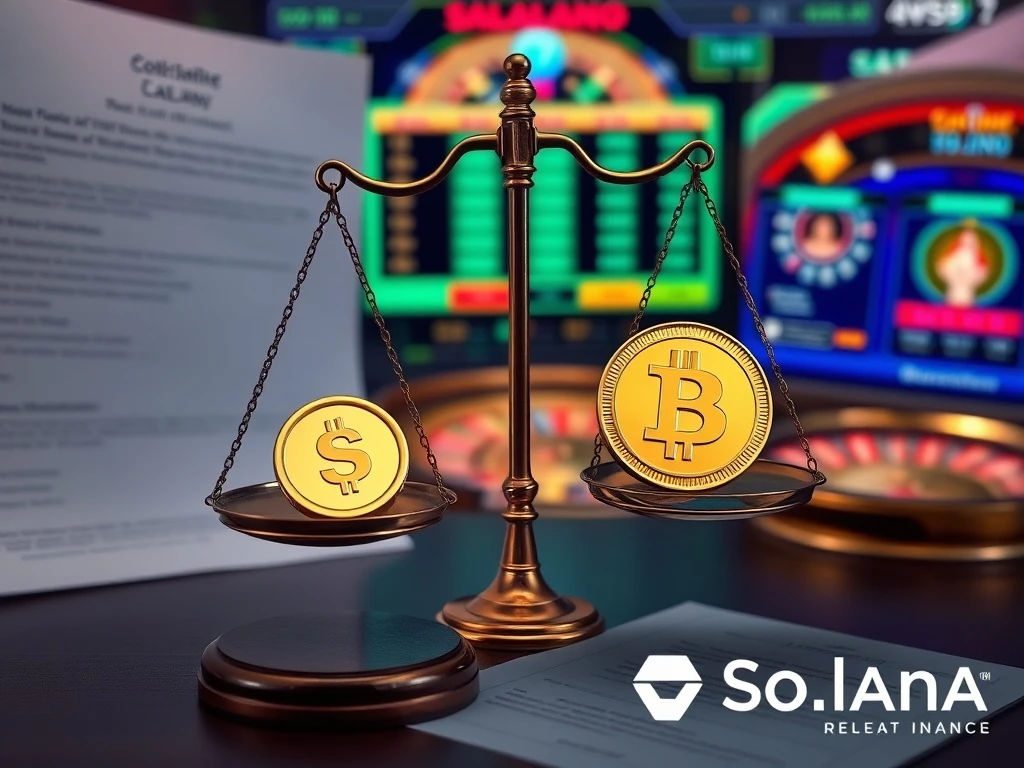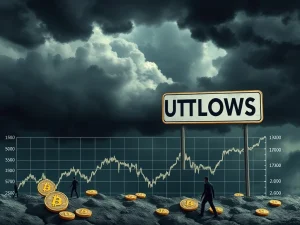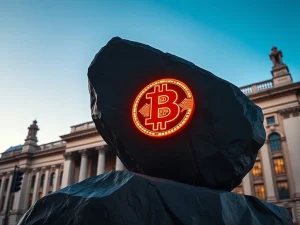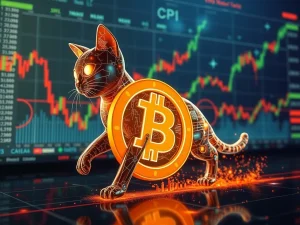Solana Lawsuit Explodes: $5.5 Billion Meme Coin Gambling Scheme Uncovered

The crypto world is abuzz with a monumental legal challenge that could redefine the boundaries of decentralized finance. A class-action Solana lawsuit has been filed, targeting Pump.fun and its Solana-affiliated partners, alleging the operation of an unlicensed digital casino through a massive meme coin trading scheme. This isn’t just another crypto dispute; it’s a high-stakes battle involving billions of dollars and potentially setting critical precedents for the entire blockchain industry.
What is the Solana Lawsuit All About?
At the heart of the controversy is an amended complaint, spearheaded by Burwick Law, filed in the Southern District of New York. This lawsuit doesn’t pull any punches, accusing Pump.fun and its associated entities of orchestrating a vast, unregulated gambling operation disguised as a meme coin trading platform. The allegations are staggering, claiming the scheme generated between $4 billion and $5.5 billion in speculative transactions.
The core accusations leveled against the defendants include:
- Violations of the Racketeer Influenced and Corrupt Organizations (RICO) Act: This serious charge implies a pattern of criminal activity conducted by an enterprise.
- Fraud: Allegations of deceptive practices designed to mislead investors.
- Civil Conspiracy: Accusations that multiple parties colluded to commit unlawful acts.
- Unjust Enrichment: Claims that the defendants profited unfairly at the expense of retail investors.
Plaintiffs assert that Pump.fun operates as a ‘rigged system,’ drawing parallels to slot machine mechanics, where the odds are inherently stacked against the users. This framing as a ‘front-facing slot machine cabinet’ highlights the perceived exploitative nature of the platform, designed to incentivize risky, high-frequency trading behaviors.
Unpacking the Pump.fun Meme Coin Gambling Model
The lawsuit meticulously details how Pump.fun’s unique model allegedly facilitates a sophisticated form of meme coin gambling. The platform’s mechanism involves the mass-production of new tokens with minimal transparency or vetting, creating a fertile ground for speculative frenzy. This approach, combined with aggressive marketing, is accused of exploiting retail investors who are often drawn in by the allure of quick riches in the volatile meme coin market.
Key aspects of the Pump.fun model under scrutiny include:
- Mass Token Generation: The ease with which new meme coins can be launched, often with little to no underlying value or development.
- Lack of Investor Protections: The platform allegedly operates without the safeguards typically found in regulated financial markets, leaving users vulnerable.
- High-Frequency Trading Strategies: The system is designed to encourage rapid buying and selling, mimicking the fast-paced, high-risk environment of casino games.
The rapid ascent of Pump.fun, which reportedly reached a $2 billion market cap after a $600 million token launch, is presented as evidence of its effectiveness in luring and exploiting retail users, making it a prime target for scrutiny under the lens of gambling regulations.
How Solana-Affiliated Partners Are Implicated
Crucially, the lawsuit extends its reach beyond just Pump.fun, implicating several prominent entities within the Solana ecosystem. Solana Labs, the Solana Foundation, Jito Labs, and the Jito Foundation are named as active participants who allegedly monetized this scheme. This broad scope raises significant questions about the responsibility of blockchain infrastructure providers.
The complaint argues that these entities did not act as neutral infrastructure providers but directly benefited from Pump.fun’s operations:
- Solana’s Alleged Profit: Solana’s infrastructure is accused of profiting substantially through blockspace fees generated by Pump.fun’s high trading volume. Furthermore, the lawsuit claims that the appreciation of the SOL token itself was tied to the speculative activity on Pump.fun, creating a direct financial incentive for Solana.
- Jito’s Role in MEV: Jito Labs and the Jito Foundation are accused of facilitating front-running – a predatory trading practice – through their maximal extractable value (MEV) tools and validator control. MEV refers to the profit validators can extract by reordering, inserting, or censoring transactions within a block.
This aspect of the lawsuit challenges the widely held notion that underlying blockchain infrastructure is merely a neutral conduit. If successful, it could establish a precedent where foundational entities are held accountable for the activities that flourish on their networks, even if those activities are ‘permissionless.’
Market Reactions and the Fallout for Meme Coins
The filing of this lawsuit has sent ripples through the crypto market, particularly within the meme coin sector. Market reactions reflect a growing unease regarding the regulatory risks associated with highly speculative tokens.
Evidence of this unease includes:
- Investor Sell-Offs: Two major early investors, identified as “PUMP Top Fund 1” and “Top Fund 2,” recently moved a substantial $160 million in PUMP tokens to exchanges, triggering a significant sell-off and price volatility.
- Presale Liquidations: BitMEX data reveals that nearly 60% of presale participants have already liquidated their holdings, further exacerbating price declines despite initial surges following the token’s launch.
Pump.fun’s initial coin offering (ICO) which raised an astonishing $500 million in just 12 minutes, underscores the speculative frenzy that characterized its rise. Now, that same frenzy is facing intense regulatory scrutiny, casting a shadow over the future of similar projects.
What Does This Mean for Blockchain Liability?
Perhaps the most significant aspect of this case is its potential to redefine blockchain liability. The legal claims raise broader questions about the regulatory boundaries of decentralized finance (DeFi) and who bears responsibility when illicit activities occur on ‘permissionless’ systems.
As Andrew Rossow of AR Media Consulting warns, the notion that ‘permissionless’ systems automatically shield entities from accountability may be challenged. If the court finds that infrastructure providers directly enable or significantly benefit from illicit activities, it could set a powerful precedent for holding them liable. This would fundamentally challenge the decentralized ethos, which often emphasizes individual responsibility and minimal oversight.
The U.S. legal system allows for broad initial allegations, and the defendants—including Pump.fun, Solana Labs, and Jito—have yet to issue their official responses. However, the outcome of this case could:
- Influence future regulatory frameworks for meme coin projects.
- Impact how crypto infrastructure providers operate and manage risk.
- Force a re-evaluation of the balance between innovation and investor protection in the crypto space.
Plaintiffs are emphasizing the systemic harm caused by unregulated trading platforms, arguing that the alleged scheme’s structure—resembling a digital casino—warrants stringent oversight. This legal battle highlights the tension between technological advancement and accountability, with implications extending far beyond Pump.fun to the broader crypto industry.
Conclusion
The Solana lawsuit against Pump.fun and its affiliated partners is more than just a dispute over alleged fraud; it’s a pivotal moment for the cryptocurrency industry. With billions of dollars at stake and serious allegations under the RICO Act crypto provisions, the case has the potential to reshape regulatory perspectives on decentralized applications and the liability of underlying blockchain infrastructure. As courts grapple with these complex issues, the outcome will undoubtedly influence how future meme coin projects are perceived, developed, and regulated, underscoring the critical need for investor protection in a rapidly evolving digital landscape. The crypto community will be watching closely as this landmark case unfolds, eager to understand its far-reaching implications.
Frequently Asked Questions (FAQs)
Q1: What is the core accusation in the lawsuit against Pump.fun and Solana-affiliated partners?
The lawsuit alleges that Pump.fun, in collaboration with Solana Labs, Solana Foundation, Jito Labs, and Jito Foundation, operated an unlicensed digital casino through a meme coin trading scheme that generated $4 billion to $5.5 billion in speculative transactions. It claims violations of the RICO Act, fraud, civil conspiracy, and unjust enrichment.
Q2: What is the RICO Act and why is it relevant to this crypto lawsuit?
The RICO (Racketeer Influenced and Corrupt Organizations) Act is a U.S. federal law that provides for extended penalties for criminal acts performed as part of an ongoing criminal organization. Its relevance here is that the lawsuit alleges a pattern of illegal activity (like operating an unlicensed casino and fraud) by an organized enterprise, which carries significant legal consequences.
Q3: How are Solana Labs and Jito Labs allegedly involved in the scheme?
The lawsuit claims Solana Labs and the Solana Foundation profited through blockspace fees and appreciation of the SOL token tied to Pump.fun’s trading volume. Jito Labs and the Jito Foundation are accused of facilitating front-running through Maximal Extractable Value (MEV) tools and validator control, directly benefiting from the alleged scheme.
Q4: What are the potential consequences of this lawsuit for the crypto industry?
If successful, this lawsuit could set a significant precedent for holding blockchain infrastructure providers liable for activities on their networks, even if those systems are ‘permissionless.’ It could redefine regulatory boundaries for DeFi, impact how meme coin projects are launched and regulated, and force a re-evaluation of the balance between innovation and investor protection.
Q5: How can investors protect themselves from speculative meme coin schemes?
Investors should exercise extreme caution with meme coins, understand their high volatility and lack of inherent value, and conduct thorough due diligence. It’s crucial to be wary of aggressive marketing, prioritize platforms with robust investor protections, and avoid investing more than you can afford to lose. Understanding the underlying technology and project transparency is also key.
Q6: What is MEV (Maximal Extractable Value)?
MEV, or Maximal Extractable Value, refers to the maximum value that can be extracted from block production in excess of the standard block reward and gas fees, by including, excluding, or reordering transactions within a block. In this context, Jito is accused of using MEV tools to facilitate front-running, where transactions are reordered to benefit certain parties at the expense of others.










